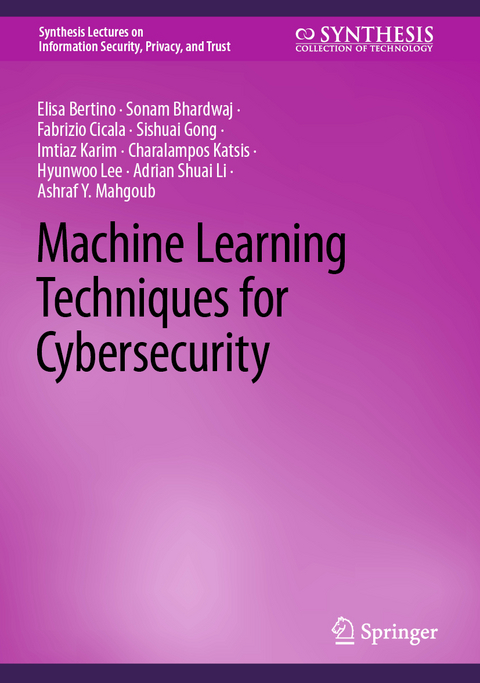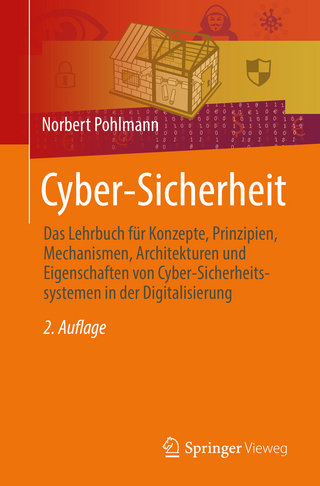
Machine Learning Techniques for Cybersecurity
Springer International Publishing (Verlag)
978-3-031-28258-4 (ISBN)
While many recent papers have proposed approaches for specific tasks, such as software security analysis and anomaly detection, these approaches differ in many aspects, such as with respect to the types of features in the model and the dataset used for training the models. In a way that no other available work does, this book provides readers with a comprehensive view of the complex area of ML for security, explains its challenges, and highlights areas for future research. This book is relevant to graduate students in computer science and engineering as well as information systems studies, and will also be useful to researchers and practitioners who work in the area of ML techniques for security tasks.
lt;b> Elisa Bertino is a Samuel D. Conte Professor of Computer Science at Purdue University. Prior to joining Purdue in 2004, she was a Professor and department head at the Department of Computer Science and Communication of the University of Milan. She has been a postdoc at the IBM Research Laboratory (now Almaden) in San Jose and a Visiting Professor at the Singapore National University and the Singapore Management University. She has worked for more than 30 years in data security and privacy. Recently she has been working on security of cellular networks, mobile applications and IoT systems, zero-trust architectures, and machine learning techniques for cybersecurity.She is a Fellow member of IEEE, ACM, and AAAS. She received the 2002 IEEE Computer Society Technical Achievement Award for "For outstanding contributions to database systems and database security and advanced data management systems", the 2005 IEEE Computer Society Tsutomu Kanai Award for "Pioneering and innovative research contributions to secure distributed systems", the 2019-2020 ACM Athena Lecturer Award, and the 2021 IEEE Innovation in Societal Infrastructure Award.
Sonam Bhardwaj is a visiting Ph.D. student at the Department of Computer Science at Purdue University. She is pursuing her Ph.D. from the Department of Computer Engineering, National Institute of Technology, Kurukshetra, India. Her research area is focused on Attack detection and evidence preservation in network forensics. Before joining as a Ph.D. student, she gained her master's degree from the University Institute of Engineering and Technology (UIET), Kurukshetra, India, with her thesis on A Novel Technique for Data De-Duplication with SHA-1 in Hadoop Framework. Her Bachelor's degree was awarded in the year 2013 by Lingayas University, Faridabad, India. In her past, she also worked with NIELIT, Delhi, India, on a project based on Big Data Hadoop and Spark. She is also a reviewer of many renowned journals and a student member of ACM and IEEE.
Fabrizio Cicala is a Ph.D. student at the Department of Computer Science at Purdue University, advised by Professor Elisa Bertino. His research area is in Information Security, focusing on vulnerability analysis of communication protocol implementations through automatic software testing methodologies. Prior to joining as a Ph.D. student, he was a visiting scholar at Purdue, where he developed his master thesis on the analysis of ransomware encryption models and encryption key generation. During his time at Purdue, he also collaborated on a project on vulnerabilities in modern smartphones basebands; the paper reporting this work received the ACSAC 2019 distinguished paper award. He also worked on designing and implementing a framework for automatic network policy generation in the context of zero-trust architectures. He obtained his master's and Bachelor's degree from the Department of Computer Science Engineering at Roma Tre University in Rome.
Sishuai Gong is a Ph.D. student in the Department of Computer Science at Purdue University. Before joining Purdue in 2019, he received a Bachelor's degree from the Department of Computer Science at the University of Science and Technology of China (USTC). His research focuses on improving the efficiency, safety, and reliability of real-world kernels, with particular interests in kernel performance (e.g., memory management) and kernel testing (e.g., concurrency testing, fuzzing).
Imtiaz Karim is a Ph.D. candidate in the Department of Computer Science at Purdue University, advised by Professor Elisa Bertino. He received his Bachelor's in Computer Science and Engineering from Bangladesh University of Engineering and Technology in 2017. His research interests lie in the security and privacy of networked systems, communication protocols, and mobile computing. His research ai
Introduction.- Background on Machine Learning Techniques.- Security Policy earning.- Software Security Analysis.- Hardware Security Analysis.- Detection.- Attack Management.- Case Studies.- Main Challenges in the Use of ML for Security.- Concluding Remarks.
| Erscheinungsdatum | 11.04.2023 |
|---|---|
| Reihe/Serie | Synthesis Lectures on Information Security, Privacy, and Trust |
| Zusatzinfo | XII, 165 p. 37 illus., 30 illus. in color. |
| Verlagsort | Cham |
| Sprache | englisch |
| Maße | 168 x 240 mm |
| Gewicht | 412 g |
| Themenwelt | Informatik ► Netzwerke ► Sicherheit / Firewall |
| Schlagworte | Anomaly Detection • cybersecurity • Intrusion Detection • IT Security Awareness • machine learning • ML-based Fuzzing |
| ISBN-10 | 3-031-28258-2 / 3031282582 |
| ISBN-13 | 978-3-031-28258-4 / 9783031282584 |
| Zustand | Neuware |
| Haben Sie eine Frage zum Produkt? |
aus dem Bereich


